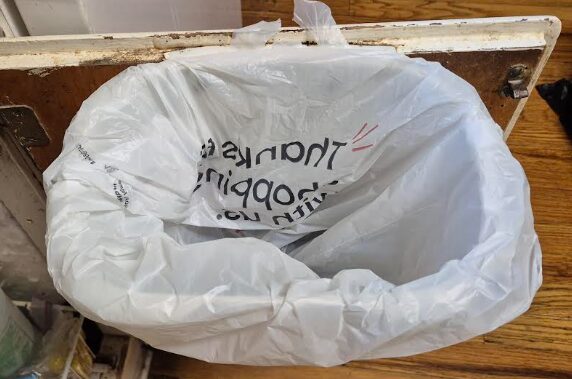From State Rep. Sue Ness:
Will Illinois Ban Plastic Bags?
Cities like Chicago [and Woodstock] have implemented a bag tax to curb the use of plastic bags.
But what if they were banned all together?

The average bag you pick up at the grocery store has a lifespan of about 12 minutes from store, to transit, to home.
When tossed, they clog sewage and storm drains, and kill an estimated 100,000 marine mammals every year from entanglement.
We know that plastic never goes away—and bags degenerate into toxic microplastics that fester in our oceans and landfills, and us, for up to 1,000 years.
Despite this, shoppers collectively use around 500 billion single-use plastic bags every year.
To break that down, that’s 150 bags per person, per year, for every single person on Earth — or enough to circle the globe 4,200 times.
Why are plastic bags still in use?
I made a promise when I ran for office that I would advocate for our Earth.
In my daily life, we’ve made adjustments to our footprint, and in Springfield, I’ve filed legislation to ban plastic bags in Illinois every session. [Emphasis added.]
Though it hasn’t passed, and didn’t this session either, we are closer than ever.
We must move away from single use plastic, and banning bags is a good place to start. While Illinois wouldn’t be setting this precedent, we’d be following in the footsteps of states who have.
Do bans work? Let’s look at the facts.
In San Jose, California, a ban was put into place in 2012 — as of data collected in 2018,, there has been an 89% reduction in plastic bags in storm drains, a 60% reduction in creeks and rivers, and a 59% drop in residential plastic waste.
Bans effectiveness don’t stop at decreasing plastic pollution.
In nearby San Francisco (ban enacted in 2007), the city has saved a reported $600,000 per year in plastic processing fees alone.
In Seattle, where bags were banned in 2013 years ago, residents have seen in 48% drop in residential plastic bag waste, and a 76% decline in commercial plastic bag waste.
In 2010, there were 262 tons’ worth of plastic bags in landfills; by 2014, that dropped to 136 tons.
Imagine what this data is in 2025!
Illinois, I know we can do this. And I’m proud to push for this change every year in Springfield!
